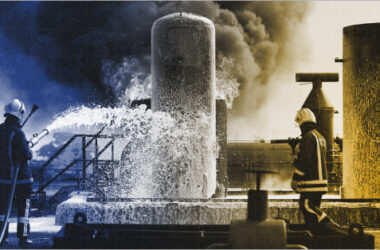Want to know about average clause in Fire Insurance? Read this blog.
An average clause in a Fire Insurance Policy takes care of underinsurance situations. A Fire Insurance Policy requires the insured to pay a proportion of the loss according to the average clause mentioned in the policy document if the assets are insured for less than their full value. As a Fire Insurance Policy is an indemnity contract, the insured cannot claim more than the actual loss.
A Fire Insurance Policy’s Average Clause States
1. A difference between the actual cost and the sum insured for goods/property must be paid by the insured.
2. Whenever there is a difference in value between the insured amount and the actual value of goods/property, the insured must pay the difference.
3. Insurers or insurance companies will only pay a proportion of the loss that is rateable.
4. Average clauses apply only to goods and property whose actual value is less than the sum insured.
If the insurance company applies the proportionate approach to Fire Insurance, the liability of the insurance company will be reduced due to the average clause. The insurers do not pay the full amount of loss incurred to the insured. The insured is then responsible for the payment of the unpaid claim amount.
The Fire Insurance Average Clause, also known as the “Underinsurance Clause,” carries immense importance within Fire Insurance Policies. Its role is crucial in determining your compensation for partial fire-related losses. The fundamental objective of this clause is to discourage policyholders from undervaluing their property and paying reduced premiums. Instead, it promotes sufficient coverage to ensure fair compensation in case of any loss.
Calculation of Fire Insurance Claim Amounts
Hence, the calculated claim amount for the insured would be as follows:
Amount of the claim = (Actual loss times insured amount) /Value of goods or property at the time of the fire
If a property worth Rs. 15,00,000 is insured for Rs. 12,00,000 and the Fire Insurance Policy includes the average clause, what do you think? As a result of the fire, the policyholder suffers a loss of about 8,50,000 based on the current value of the property (half the amount). However, the insurer pays:
= (8,50,000 × 12,00,000)/ 15,00,000
=6,80,000
So, the additional amount of Rs. 70,000 (7,50,000 – 6,80,000) must be borne by the insured himself.
What The Average Clause In Fire Insurance Means For Your Business Insurance?
As a result of a loss or damage to the insured property, the average Fire Insurance Policy can affect the coverage and settlement amount. It is equally damaging to have inadequate insurance coverage whether it was done deliberately or accidentally. The consequences are the same regardless of whether you were at fault or not.
It is unlikely you will receive full compensation for your losses.
As a result of the “average clause,” your insurance company will reduce the amount of your claim.
Underinsured people also have a higher chance of their insurance company cancelling their coverage, making it more difficult for them to find insurance on their buildings and belongings from other companies.
Case Study: Claim settlement under Fire Insurance
The 45-year-old Ravi owned a rice mill in Kolkata, where he catered to customers across West Bengal. He exported rice according to the clients’ needs. In May 2006, a fire broke out in his factory and damaged half of the stock which was to be shipped to a nearby dealer. The workers recovered the other half of the stock before the fire engulfed it. Ravi had taken out a Fire Insurance Policy to protect his stock. In the aftermath of the fire, Ravi contacted his insurance company to obtain coverage for his losses.
On investigation, the surveyor found that the fire was caused by a short circuit in the production area; therefore, half of the stock was damaged and burnt. This stock’s details are as follows:
· Actual value of the stock: Rs 5,00,000
· Sum insured for the stock: Rs. 3,00,000
· Loss incurred: Rs. 2,50,000 (As half the stock was destroyed)
Hence, the insurer settled the following Ravi’s claim as per the average clause –
Claim amount= (Actual loss × Sum insured) /Value of stock at the date of the fire
= (2,50,000 × 3,00,000) / 5,00,000
=1,50,000
Ravi’s insurers paid a claim amount of 1.5 lakh, even though the actual loss amount was 2.5 lakhs. Ravi was responsible for the additional loss of 1 lakh rupees.
FAQs
1. Are average clauses applicable only to Fire Insurance Policies or to other types of insurance as well?
Fire Insurance often uses the average clause, but it can also be applied to other forms of property insurance. It is particularly prevalent in policies where the insured value has a significant impact on the settlement. In other words, even though it’s predominantly found in Fire Insurance, similar principles may apply to other property insurance contexts to prevent underinsurance and ensure fair compensation for partial losses.
2. Are you able to avoid the Average Clause by insuring your property for a higher amount?
You may be able to receive a greater claim amount if your property is insured for more, but it is imperative that you do so accurately and transparently in case of a partial loss. Trying to manipulate the claim amount by overvaluing the property could result in policy violations and denies. To avoid resorting to underhanded tactics, one must genuinely assess the value of a property and make sure it is adequately covered.
3. Is there any circumstance where the Average Clause might not apply, even if the property is underinsured?
There are some insurance policies that include endorsements or clauses that modify the application of the average clause. In some cases, the average clause may not be strictly followed by certain high-value items or specialized coverage. To understand the precise conditions under which the average clause might be modified or excluded, it’s crucial to carefully read and understand your policy documentation and speak to your insurance provider.








